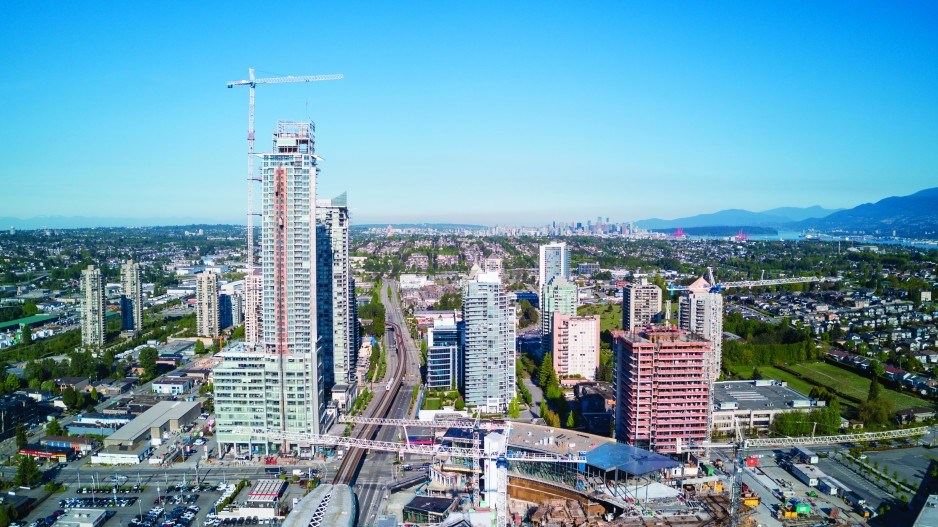Amid heightened global uncertainty, a severe commodities slump and acute affordability challenges in the Lower Mainland, British Columbia’s economy hasn’t just made it through the last several years – it has thrived.
“The last three or four years from a macroeconomic point of view really have been the best of times,” explained Jock Finlayson, executive vice-president and chief policy officer of the Business Council of British Columbia (BCBC).
Commodity markets improved “dramatically” in 2017, B.C.’s population grew and employment is poised to expand by 3.5%. Even with two interest rate hikes from the Bank of Canada, the cost of money remains highly attractive, and historically low. The BCBC’s latest economic review and outlook also cites a booming tourism sector, “robust” consumer spending and rising incomes as contributing factors to B.C.’s impressive economic growth.
“We know there’s been well over $100 billion of gains and net worth for households in the Lower Mainland, for example, in the last four years,” Finlayson said. “And some of that is being spent in the consumer retail marketplace.”
Unlike in 2015 and 2016, B.C. didn’t lead Canada in growth in 2017 – the province was toppled from the top spot by Alberta’s resurging economy, which grew 4.1% this year, according to RBC Economics. B.C. did, however, top 3% growth for the fourth year in a row, with a rate of 3.2% that ranks above the country’s average.
In 2018, the BCBC, RBC and other institutions are tempering their expectations.
“It’s an economy coming off the boil a bit,” Finlayson said. “We’ve been growing above potential.”
RBC’s provincial outlook forecasts real gross domestic product growth of 2.2% – not as impressive as 2017, but RBC Economics is still “pretty positive” about B.C.’s prospects, given its track record over the past four years, said senior economist Robert Hogue.
“We’re expecting that the unemployment rate in B.C. will be the lowest in Canada in 2018,” Hogue said. “But the flip side of that is that in terms of firms trying to hire, it’s going to become a little bit more difficult. It may raise labour costs a bit, and so it may have a restraining effect on overall growth in the province.”
He added that B.C. has benefited “significantly” from labour flowing from Alberta to work in B.C. With Alberta’s economic resurgence, that trend will likely moderate.
The BC NDP government will table its first full budget in the new year. While the party’s policies will differ from those of the previous Liberal government on a number of issues, Finlayson says he has yet to see the data on how new politics will affect business sentiment and investment in B.C.
Among the policies slated to be introduced in 2018: a 50% reduction in Medical Services Plan premiums, a higher carbon tax and a corporate tax rate of 12%.
At the national level, RBC anticipates three interest rate hikes from the Bank of Canada next year, the cumulative effect of which would be felt most in the second half of 2018. An expected overnight rate of 1.75% is nothing businesses can’t handle, said Hogue, but it could rein in investment, and will likely slow B.C.’s housing market.
And in the same way that B.C.’s housing market makes the province sensitive to interest rate hikes, so too does its economic makeup make it sensitive to export threats and challenges.
The province is less vulnerable to U.S. protectionism than its provincial counterparts, with around half of exports heading south of the border, compared with more than 80% of exports from Alberta and Ontario. But trade uncertainty, threats to the North American Free Trade Agreement (NAFTA), and the ongoing Canada-U.S. softwood lumber dispute pose risks to B.C.’s economic health.
“There is nobody that you know, and there’s nobody that I know, in the past 18 months of our lives, that have not been forced to have an out-loud conversation about Donald Trump, every single day for the last 18 months – that’s just a fact,” said James Moore, Canada’s former minister of labour under prime minister Stephen Harper, and currently a sitting NAFTA advisory council member.
“I think people should look to 2018 with a great deal of skepticism and caution, on a number of fronts, and it’s not just the substance of the NAFTA negotiations, but of course the reaction to it,” he added.
Moore expects the heavy lifting in NAFTA will be pushed to the seventh and final negotiation round, scheduled for Montreal in January. He is optimistic that an agreement can be reached, but whether one will be is another issue.•




